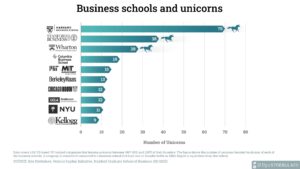The best time to pursue an MBA depends on your career goals, experience, and life circumstances.
There is little value in doing an MBA straight after your undergraduate degree and most students wait until they they have acquired a few years of work experience and are seeking career advancement, a change in industry, or leadership roles. Here are some key factors to consider:
3-5 Years of Work Experience
Most MBA programs recommend having 3-5 years of work experience before applying. This allows you to gain practical insights into the business world, build professional skills, and understand how you want to shape your career. Work experience enriches your MBA experience, as it helps you contextualise the theoretical knowledge you gain and contribute meaningfully to discussions in class.
Many top business schools prefer candidates with several years of experience, as they can draw on their professional backgrounds to enhance class dynamics and case studies. For example, Harvard Business School reports an average work experience of 4-5 years among its students .
When Seeking Career Advancement or Transition
An MBA is an excellent option if you’re looking to move into management, transition into a new industry, or start your own business. For example, many professionals in technical fields, such as engineering or IT, pursue an MBA to shift into leadership roles or business development. The degree also helps those in finance, consulting, or marketing move up to senior or executive positions.
If you’re in a role where career growth seems limited, an MBA can provide the skills and network needed to break into new opportunities. For those looking to transition into different sectors, such as finance or consulting, business schools provide access to recruiters, alumni networks, and career services that ease the shift.
Mid-Career for Leadership Aspirations
For professionals in mid-level roles, often with 5-10 years of experience, an MBA can provide the strategic skills and leadership training necessary to take the next step into executive or senior management positions. This is a critical time if you’re looking to accelerate your career progression or gain a deeper understanding of business management across various functions.
Many mid-career professionals see an MBA as an opportunity to refocus their careers or enhance their strategic thinking. For instance, Wharton, Kellogg, and INSEAD often attract mid-career applicants who are transitioning into leadership roles .
Before Major Personal Commitments
The timing of pursuing an MBA often intersects with personal life decisions. Many professionals choose to complete their MBA before major life events, such as starting a family, buying a home, or making long-term financial commitments. Full-time MBA programs can be time-intensive, requiring students to step away from their jobs, so it is ideal to pursue it when you have fewer personal responsibilities.
For those who are already deeply invested in family or other personal commitments, part-time or executive MBA programs offer more flexibility and allow you to study while working. These options are ideal for professionals who cannot take a career break but still want the MBA’s benefits.
After Building a Strong Network
An MBA also serves as a platform to build a broader professional network. If you have a solid network in your current industry or company but are looking to expand globally or across industries, an MBA can provide that opportunity. Business schools host professionals from all over the world, providing a unique space to develop lifelong connections that can help in future career growth.
The best time to pursue an MBA is when you have a clear understanding of your career trajectory and have accumulated sufficient work experience to benefit from the program. Generally, candidates with 3-7 years of experience, looking to transition careers, move into leadership, or gain broader business skills, are in the optimal position to pursue an MBA. Aligning your professional and personal goals with the timing of the MBA will ensure you make the most of the investment in your education.







